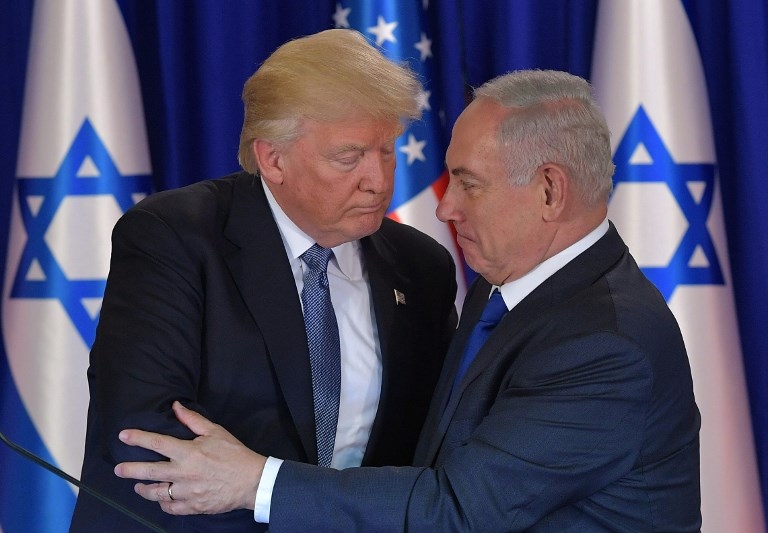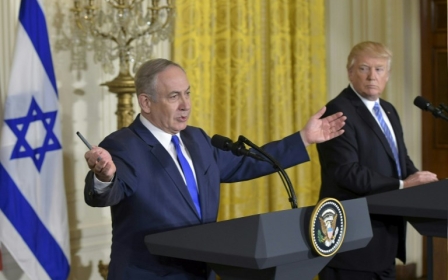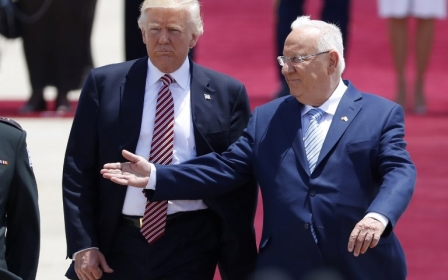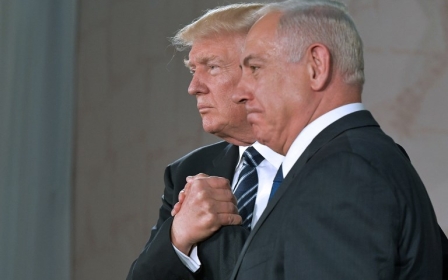Trump will not move US embassy to Jerusalem for now: Officials

President Donald Trump has decided not to move the US embassy in Israel to Jerusalem for now, a US official said Thursday, shying away from one of Trump's controversial campaign promises.
An official, speaking to AFP on condition of anonymity, said that Trump had signed a legal waiver that keeps the embassy in Tel Aviv, but insisted this was delay not a reversal.
"It's a question of when, not if," the official said, adding that "he doesn't think the timing is right, right now."
"In timing such a move he will seek to maximize the chances of successfully negotiating a deal between Israel and the Palestinians."
Despite his campaign pledge to go ahead with the controversial move and a deadline for a decision looming, Trump is set to continue his predecessors' policy of signing a six-month waiver overriding a 1995 law requiring that the embassy be transferred to Jerusalem, an action that would have complicated his efforts to restart Israeli-Palestinian peace talks, officials said.
New MEE newsletter: Jerusalem Dispatch
Sign up to get the latest insights and analysis on Israel-Palestine, alongside Turkey Unpacked and other MEE newsletters
The move prompted Israeli Prime Minister Benjamin Netanyahu to express disappointment on Thursday afternoon.
"Though Israel is disappointed that the embassy will not move at this time, we appreciate today's expression of President Trump’s friendship to Israel and his commitment to moving the embassy in the future," Netanyahu said in a statement.
It added that: "Israel's consistent position is that the American embassy, like the embassies of all countries with whom we have diplomatic relations, should be in Jerusalem, our eternal capital.
"Maintaining embassies outside the capital drives peace further away by helping keep alive the Palestinian fantasy that the Jewish people and the Jewish state have no connection to Jerusalem."
The Palestinian leadership however welcomed President Trump's decision, saying it "gives peace a chance".
"This is in line with the long-held US policy and the international consensus and it gives peace a chance," Hussam Zomlot, Palestinian ambassador to the United States, said in a statement.
"We are ready to start the consultation process with the US administration. We are serious and genuine about achieving a just and lasting peace."
Trump is required by law to act by Friday and a public statement confirming the waiver is expected soon, according to another US official who spoke on condition of anonymity.
Sources say his administration intends to make clear, that Trump remains committed to the promise he made during the 2016 presidential campaign, though it will not set a specific timetable for doing so, officials said.
While there have been divisions among Trump's aides on the issue, the view that appears to have prevailed is that the United States should keep the embassy in Tel Aviv for now to avoid angering the Palestinians, Arab governments and Western allies while the president seeks to nurture peace efforts.
Trump avoided any public mention of a potential embassy move during his visit to Israel and the West Bank in May. Despite that, most experts are sceptical of Trump’s chances for achieving a peace deal that eluded other US presidents.
The status of Jerusalem is one of the major stumbling blocks. Israel captured Arab East Jerusalem during the 1967 Middle East war and later annexed it, a move not recognised internationally. Israel considers all of the city its indivisible capital.
Pro-Israel rhetoric
The Palestinians want East Jerusalem as the capital of their future state. Jerusalem is home to holy sites of the Jewish, Muslim and Christian religions.
Shifting the US embassy would be widely seen as Washington's recognition of the Israeli position on Jerusalem's status, which successive US administrations have said must be decided in negotiations between the two sides.
Former president Barack Obama renewed the waiver in December, setting off a six-month clock for Trump. CNN was first to report that Trump was expected to sign the waiver.
On the campaign trail, Trump's pro-Israel rhetoric raised expectations that he would act quickly to move the embassy. But after he took office in January, the issue lost momentum as he met Arab leaders who warned it would be hard to rejuvenate long-stalled peace efforts unless he acted as a fair mediator.
Some of Trump's top aides have pushed for him to keep his campaign promise, not only because it would be welcomed by most Israelis but to satisfy the pro-Israel, right-wing base that helped him win the presidency. The state department, however recommended against an embassy move, one US official said.
"The president is still committed to moving the embassy," one US official said. "It's not a question of whether but when it will be done."
The Jerusalem Embassy Act passed by Congress in 1995 mandating relocation of embassy to Jerusalem allows the president to waive the requirement in accordance with US national security interests.
Middle East Eye delivers independent and unrivalled coverage and analysis of the Middle East, North Africa and beyond. To learn more about republishing this content and the associated fees, please fill out this form. More about MEE can be found here.




